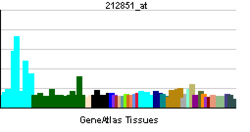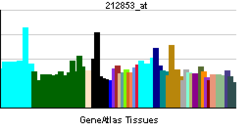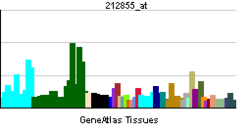- DCUN1D4
-
DCN1, defective in cullin neddylation 1, domain containing 4 (S. cerevisiae) Identifiers Symbols DCUN1D4; FLJ42355; KIAA0276 External IDs OMIM: 612977 MGI: 2140972 HomoloGene: 22867 GeneCards: DCUN1D4 Gene Gene Ontology Molecular function • molecular_function Cellular component • cellular_component Biological process • biological_process Sources: Amigo / QuickGO RNA expression pattern 


More reference expression data Orthologs Species Human Mouse Entrez 23142 100737 Ensembl ENSG00000109184 ENSMUSG00000051674 UniProt Q92564 Q2YDW5 RefSeq (mRNA) NM_001040402.1 NM_178896 RefSeq (protein) NP_001035492.1 NP_849227 Location (UCSC) Chr 4:
52.71 – 52.78 MbChr 5:
73.87 – 73.95 MbPubMed search [1] [2] DCN1-like protein 4 is a protein that in humans is encoded by the DCUN1D4 gene.[1][2]
References
- ^ Kurz T, Ozlu N, Rudolf F, O'Rourke SM, Luke B, Hofmann K, Hyman AA, Bowerman B, Peter M (Jun 2005). "The conserved protein DCN-1/Dcn1p is required for cullin neddylation in C. elegans and S. cerevisiae". Nature 435 (7046): 1257–61. doi:10.1038/nature03662. PMID 15988528.
- ^ "Entrez Gene: DCUN1D4 DCN1, defective in cullin neddylation 1, domain containing 4 (S. cerevisiae)". http://www.ncbi.nlm.nih.gov/sites/entrez?Db=gene&Cmd=ShowDetailView&TermToSearch=23142.
Further reading
- Nagase T, Seki N, Ishikawa K, et al. (1997). "Prediction of the coding sequences of unidentified human genes. VI. The coding sequences of 80 new genes (KIAA0201-KIAA0280) deduced by analysis of cDNA clones from cell line KG-1 and brain.". DNA Res. 3 (5): 321–9, 341–54. doi:10.1093/dnares/3.5.321. PMID 9039502.
- Hartley JL, Temple GF, Brasch MA (2001). "DNA Cloning Using In Vitro Site-Specific Recombination". Genome Res. 10 (11): 1788–95. doi:10.1101/gr.143000. PMC 310948. PMID 11076863. http://www.pubmedcentral.nih.gov/articlerender.fcgi?tool=pmcentrez&artid=310948.
- Wiemann S, Weil B, Wellenreuther R, et al. (2001). "Toward a Catalog of Human Genes and Proteins: Sequencing and Analysis of 500 Novel Complete Protein Coding Human cDNAs". Genome Res. 11 (3): 422–35. doi:10.1101/gr.GR1547R. PMC 311072. PMID 11230166. http://www.pubmedcentral.nih.gov/articlerender.fcgi?tool=pmcentrez&artid=311072.
- Simpson JC, Wellenreuther R, Poustka A, et al. (2001). "Systematic subcellular localization of novel proteins identified by large-scale cDNA sequencing". EMBO Rep. 1 (3): 287–92. doi:10.1093/embo-reports/kvd058. PMC 1083732. PMID 11256614. http://www.pubmedcentral.nih.gov/articlerender.fcgi?tool=pmcentrez&artid=1083732.
- Strausberg RL, Feingold EA, Grouse LH, et al. (2003). "Generation and initial analysis of more than 15,000 full-length human and mouse cDNA sequences". Proc. Natl. Acad. Sci. U.S.A. 99 (26): 16899–903. doi:10.1073/pnas.242603899. PMC 139241. PMID 12477932. http://www.pubmedcentral.nih.gov/articlerender.fcgi?tool=pmcentrez&artid=139241.
- Gerhard DS, Wagner L, Feingold EA, et al. (2004). "The Status, Quality, and Expansion of the NIH Full-Length cDNA Project: The Mammalian Gene Collection (MGC)". Genome Res. 14 (10B): 2121–7. doi:10.1101/gr.2596504. PMC 528928. PMID 15489334. http://www.pubmedcentral.nih.gov/articlerender.fcgi?tool=pmcentrez&artid=528928.
- Wiemann S, Arlt D, Huber W, et al. (2004). "From ORFeome to Biology: A Functional Genomics Pipeline". Genome Res. 14 (10B): 2136–44. doi:10.1101/gr.2576704. PMC 528930. PMID 15489336. http://www.pubmedcentral.nih.gov/articlerender.fcgi?tool=pmcentrez&artid=528930.
- Kimura K, Wakamatsu A, Suzuki Y, et al. (2006). "Diversification of transcriptional modulation: Large-scale identification and characterization of putative alternative promoters of human genes". Genome Res. 16 (1): 55–65. doi:10.1101/gr.4039406. PMC 1356129. PMID 16344560. http://www.pubmedcentral.nih.gov/articlerender.fcgi?tool=pmcentrez&artid=1356129.
- Mehrle A, Rosenfelder H, Schupp I, et al. (2006). "The LIFEdb database in 2006". Nucleic Acids Res. 34 (Database issue): D415–8. doi:10.1093/nar/gkj139. PMC 1347501. PMID 16381901. http://www.pubmedcentral.nih.gov/articlerender.fcgi?tool=pmcentrez&artid=1347501.
Categories:- Human proteins
- Chromosome 4 gene stubs
Wikimedia Foundation. 2010.
